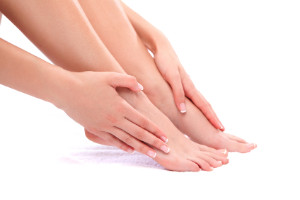Who Is Prone to Developing Cuboid Syndrome?
Monday, 24 June 2019 00:00 There are seven tarsal bones in the foot, and one of them is referred to as the cuboid bone. If the joints surrounding this bone should become inflamed as a result of an injury, cuboid syndrome may develop. Pain is typically felt on the outside of the foot, near the bottom of the fourth and fifth toes. Additionally, some patients may experience discomfort in the middle of the foot. Research has shown this ailment may be more common among athletes and dancers than of the rest of the population. Overusing the foot is also a common cause of cuboid syndrome. Some of the symptoms that are associated with this condition often include swelling, difficulty in walking, and limited range of motion. Mild relief may be found when the foot is elevated, and when the activity that caused this condition is temporarily eliminated. If you have cuboid syndrome, it is suggested that you seek the counsel of a podiatrist who can assist you with the best course of treatment.
There are seven tarsal bones in the foot, and one of them is referred to as the cuboid bone. If the joints surrounding this bone should become inflamed as a result of an injury, cuboid syndrome may develop. Pain is typically felt on the outside of the foot, near the bottom of the fourth and fifth toes. Additionally, some patients may experience discomfort in the middle of the foot. Research has shown this ailment may be more common among athletes and dancers than of the rest of the population. Overusing the foot is also a common cause of cuboid syndrome. Some of the symptoms that are associated with this condition often include swelling, difficulty in walking, and limited range of motion. Mild relief may be found when the foot is elevated, and when the activity that caused this condition is temporarily eliminated. If you have cuboid syndrome, it is suggested that you seek the counsel of a podiatrist who can assist you with the best course of treatment.
Cuboid syndrome, also known as cuboid subluxation, occurs when the joints and ligaments near the cuboid bone in the foot become torn. If you have cuboid syndrome, consult with Dr. Robert Graser from Graser Podiatry and Bunion Surgery Institute. Our doctor will assess your condition and provide you with quality foot and ankle treatment.
Cuboid syndrome is a common cause of lateral foot pain, which is pain on the outside of the foot. The condition may happen suddenly due to an ankle sprain, or it may develop slowly overtime from repetitive tension through the bone and surrounding structures.
Causes
The most common causes of cuboid syndrome include:
- Injury – The most common cause of this ailment is an ankle sprain.
- Repetitive Strain – Tension placed through the peroneus longus muscle from repetitive activities such as jumping and running may cause excessive traction on the bone causing it to sublux.
- Altered Foot Biomechanics – Most people suffering from cuboid subluxation have flat feet.
Symptoms
A common symptom of cuboid syndrome is pain along the outside of the foot which can be felt in the ankle and toes. This pain may create walking difficulties and may cause those with the condition to walk with a limp.
Diagnosis
Diagnosis of cuboid syndrome is often difficult, and it is often misdiagnosed. X-rays, MRIs and CT scans often fail to properly show the cuboid subluxation. Although there isn’t a specific test used to diagnose cuboid syndrome, your podiatrist will usually check if pain is felt while pressing firmly on the cuboid bone of your foot.
Treatment
Just as the range of causes varies widely, so do treatments. Some more common treatments are ice therapy, rest, exercise, taping, and orthotics.
If you have any questions, please feel free to contact our office located in Boerne, . We offer the newest diagnostic and treatment technologies for all your foot care needs.
Featured Articles
- July 2024
- June 2024
- May 2024
- April 2024
- March 2024
- February 2024
- January 2024
- December 2023
- November 2023
- October 2023
- September 2023
- August 2023
- July 2023
- June 2023
- May 2023
- April 2023
- March 2023
- February 2023
- January 2023
- December 2022
- November 2022
- October 2022
- September 2022
- August 2022
- July 2022
- June 2022
- May 2022
- April 2022
- March 2022
- February 2022
- January 2022
- December 2021
- November 2021
- October 2021
- September 2021
- August 2021
- July 2021
- June 2021
- May 2021
- April 2021
- March 2021
- February 2021
- January 2021
- December 2020
- November 2020
- October 2020
- September 2020
- August 2020
- July 2020
- June 2020
- May 2020
- April 2020
- March 2020
- February 2020
- January 2020
- December 2019
- November 2019
- October 2019
- September 2019
- August 2019
- July 2019
- June 2019
- May 2019
- April 2019
- March 2019
- February 2019
- January 2019
- December 2018
- November 2018
- October 2018
- September 2018
- August 2018
- July 2018
- June 2018
- May 2018








